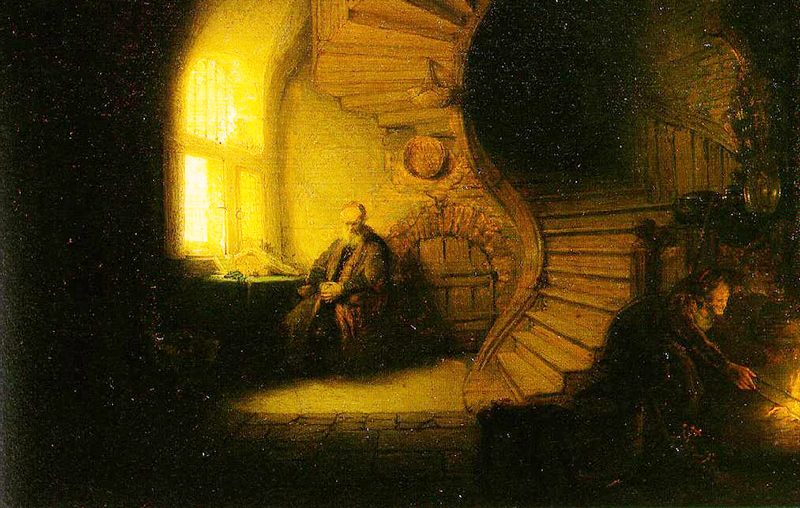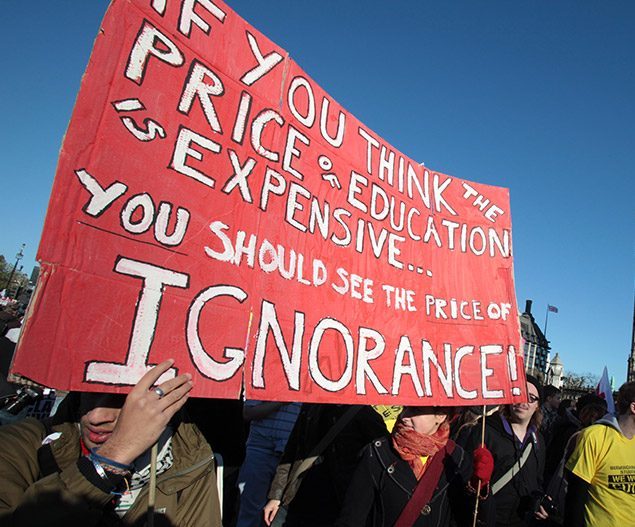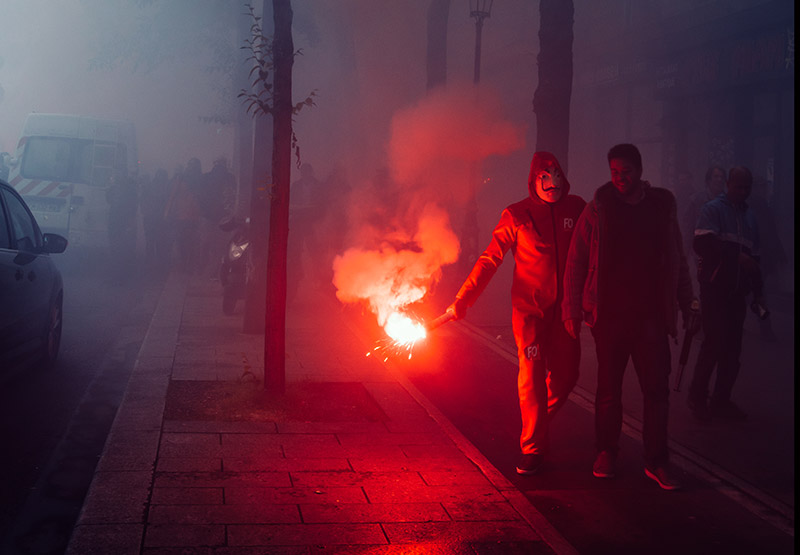Jaffa was wrong about the root of today's academic problems.
The Loss of Learning and the Vocationalization of Higher Education

Our universities are being transformed into institutions of professional training and certification.
We live in an age when higher education is being swallowed up by vocational and professional training. This instrumentalization of higher education was itself preceded by the conversion of higher learning—or learning for its own sake—into higher education. In both these transformations the purpose of the university has been lost. In a little-known but significant essay entitled “Our English Syllabus,” C. S. Lewis distinguishes three things: vocational training, education, and learning. “Schoolmasters in our time are fighting hard in defense of education against vocational training,” he writes; “universities, on the other hand, are fighting against education on behalf of learning.” Whereas Lewis faced the danger of the loss of learning to education, we are witnessing the attempt to convert universities into institutions of vocational training and professional certification. Administrators and faculty as well as boards and legislatures that oversee universities have lost the ability to distinguish vocational training and professional certification from education and to distinguish learning from both. In the course of our devolution, we have forgotten what learning is.
The purpose of vocational training, as Lewis notes, is to prepare a person for work—whether of electricians, surgeons, or bankers. Such training, he says, usually focuses on the world we live in—the here and now—rather than the world of great literature. In contrast, the purpose of education is the formation of a good person and a good citizen. As Lewis notes, we ought not construe “good” merely in the narrowly ethical sense (though good should be understood to include the ethical sense). Education exists to encourage “civil behavior” via the inculcation of right sentiments. Put another way, education, as distinct from vocational training, exists for the proper formation of what Plato called the thumos—the spirited element of the soul or of what we call the passions. Since the thumos governs the appetites, proper formation of the passions is requisite to elevate human beings above a life of enslavement to their dominant appetites—a life in which reason is reduced to an instrument that tells one how to achieve whatever end is dictated by desire. As Plato sees it, individuals determined by their appetites are drones. Education seeks the cultivation of a human self that is master of rather than enslaved to appetite or desire.
For Lewis, learning proceeds on the assumption that one’s education is already complete. Human societies devoted to learning, “have usually held a belief…that knowledge is the natural food of the human mind” and that the activity of pursuing knowledge “is good in itself besides being always honorable and sometimes useful to the whole society.” Thus, human beings in such societies have created “institutions for the support and encouragement” of persons devoted to learning for its own sake. Indeed, dedication to the pursuit of knowledge for its own sake in some domain of learning—whether astronomy, biology, history, physics, metaphysics, ethics, or something else—is what sets the university apart from other associations. This pursuit of learning for its own sake constitutes the raison d’être for a university’s faculty. Those we denominate students at a university are individuals who have begun to study something— whether the motion of the stars or the nature of the good—for its own sake. Says Lewis, the proper question of a new university student is not “Which course of study will do me the most good?” but, rather, “What do I want to know?” The role of the professor qua professor in relation to the student is not to teach the student how to learn, but rather to introduce the student to a subject matter or area of inquiry worth pursuing for its own sake.
Or, at least, that’s the ideal. By Lewis’s time Oxford had already become “very largely a place of teaching,” which is to say, of education. “I spend most of the term teaching,” he wrote, “and my tutorial stipend is part of my income no less important than my fellowship.” As well, he suspected that most students came to Oxford “with the idea of completing [their] education rather than with the idea of entering a society devoted to the pursuit of knowledge for its own sake.” Lewis surmises that this change in the work of the university resulted from the discovery that “learning has…educational value. Learning is not education; but it can be used educationally by those who do not propose to pursue learning all their lives.” That an intrinsic or non-instrumental good like learning should also prove beneficial is not surprising. Lewis notes that games—in particular, athletic competitions—can have beneficial effects that are not themselves the purpose of the game, which is simply the pleasure of playing the game. Indeed, if one plays the game for its beneficial effects rather than to win (or rather than for the pleasure of competing to win), both the beneficial effects and the game itself are lost. Something similar holds with learning. The educational benefits of learning can only be attained when learning is pursued for its own sake rather than for the sake of educational benefits it might also provide. Aim at the educational benefits of learning as the goal and both the good of knowledge for its own sake and the benefits of such knowledge are lost.
For Lewis, the great danger to learning and the institution dedicated to it—the university—was that learning would be swallowed up by education as the university was transformed into an institution dedicated to education instead of learning. That we call universities institutions of higher education reveals the degree to which his concern has been realized with the caveat that most of what we call higher education is unconcerned with the proper formation of the soul.
But the danger we face today is greater still. University administrators and state governments seek the transformation of higher education into vocational training. Universities—especially public universities—are being transformed into institutions of professional training and certification. From the standpoint of university administrations and state government officials, the pursuit of knowledge is not something universities undertake for its own sake; rather, university education is for the sake of preparing the young for stable careers capable of withstanding economic turbulence and that provide a wage adequate to the exigencies of modern life. On the older model, the pursuit of knowledge was a higher end—a perfection of—human nature. On that model, life was for the sake of “thought, art, literature, and conversation.” On the new model, the pursuit of knowledge is merely for preservation.
The conversion of American universities into institutes for vocational training—into institutions that focus primarily on training people for careers—flips the university’s original purpose precisely on its head. This conversion relativizes the intrinsic good that universities were founded to pursue.
In his day, Harry Jaffa set himself against the encroachment of relativism into the pedagogy. In our day, we confront the danger of the loss of the university itself. To be sure, something with the name of university will persist and some who work in these new institutions still called universities might pursue knowledge for its own sake. Nonetheless, as the institution once dedicated to learning is converted away from its original purpose into an institution devoted to professional training, the pursuit of knowledge for its own sake will become increasingly rare. Thought—and the pursuit of knowledge in order to know—is an essential ingredient of civilization. Thus, with the loss of institutions dedicated to that pursuit, we witness the retreat of civilization. Moreover, knowledge is of truth. The loss of the notion that knowledge is desirable for its own sake goes hand in hand with the ascension of the view that truth is merely beneficial rather than something good in and of itself.
Father James V. Schall S.J., in The Unseriousness of Human Affairs, argues that the most important front in the campaign against relativism today is awakening the minds of our fellow citizens to the reality of intrinsic goods—to the reality of actions and things desirable for their own sake and not for the sake of anything else, even if such goods are also beneficial.
Part and parcel of this re-awakening involves recovering the notion of the university as an institution that is in its essence dedicated to learning for its own sake. There are, of course, societal and educational benefits to knowledge so pursued. And we should make those arguments as well. But if pedagogy is to be recovered from deconstructionism, which undermines the idea that knowledge is knowledge of what is true, we must return the university to the task for which it was originally conceived. Indeed, in order to salvage universities from the rubble left by the transformation of universities into institutions of vocational training, we must again learn to distinguish learning from education and insist that learning is centrally important to the conservation of civilization and what the university is for.
The American Mind presents a range of perspectives. Views are writers’ own and do not necessarily represent those of The Claremont Institute.
The American Mind is a publication of the Claremont Institute, a non-profit 501(c)(3) organization, dedicated to restoring the principles of the American Founding to their rightful, preeminent authority in our national life. Interested in supporting our work? Gifts to the Claremont Institute are tax-deductible.
Our universities' loss of intelligent direction is a greater threat than their radicalization.
Colleges today encourage students to conflate youthful arrogance with high moral purpose.
The cowardice of our faculty and administration continues unabated.
Universities will continue as they are—unless the money stops flowing.
This week's feature is based on the following essay (downloadable as a PDF) written by Professor Harry V. Jaffa in 1989, which served as his farewell address to full-time faculty status at Claremont McKenna College. It remains an illuminating and prophetic statement in response to political correctness and the decay of higher education in contemporary America. The newly published book of his writings from which it is taken can be purchased at the link below.






